Creatine is a popular supplement used by athletes and bodybuilders to improve performance. Although it is generally considered safe, there are some concerns about its use by teenagers. Creatine can cause dehydration, kidney problems, and gastrointestinal issues. It can also interfere with some medications. Therefore, it is important to consult with a doctor before taking creatine, especially if you are a teenager.
Is Creatine Safe For Teens?
However, there is some concern that creatine may not be safe for teens. Creatine is a supplement that has been shown to improve athletic performance. It is also a popular supplement among bodybuilders and other athletes.
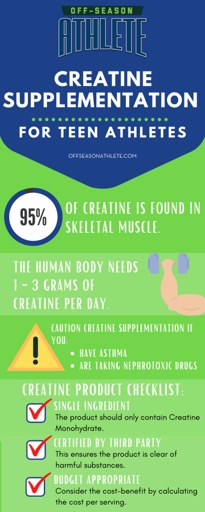
In fact, creatine has been shown to be safe for teens in studies. However, it is important to note that creatine is a supplement and should not be used as a replacement for a healthy diet and lifestyle. There is no evidence that creatine is unsafe for teens.
What Does Creatine Do?
Although creatine is found in the human body, its levels are increased when people take it as a supplement. When used as a supplement, it is often claimed to improve exercise performance and increase muscle mass. Creatine is a substance that is found in the human body and is also sold as a dietary supplement.
It does this by increasing the levels of a molecule called adenosine triphosphate (ATP). ATP is the main energy source for cells, and increasing its levels can help cells work harder and for longer periods of time. Creatine is thought to improve exercise performance by increasing energy production in cells.
Some studies have found that it can improve short-term exercise performance, such as sprinting and weightlifting, but other studies have found no benefit. Some research has shown that taking creatine as a supplement can improve exercise performance, but the evidence is mixed.
Some studies have found that it can help people gain a small amount of muscle mass, but other studies have found no benefit. Creatine is also claimed to increase muscle mass, but again, the evidence is mixed.
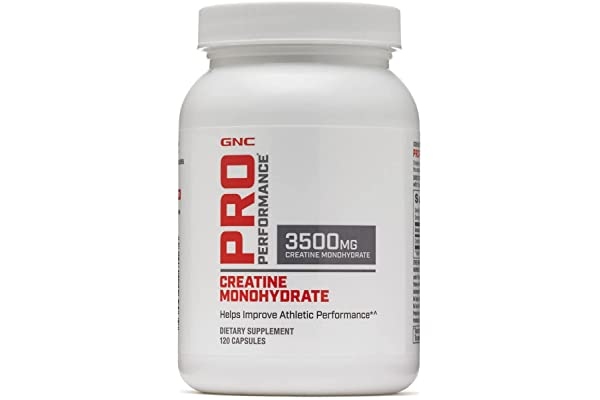
The answer is that it depends on the person. The best way to find out if creatine is right for you is to talk to your doctor or a registered dietitian. Some people may see benefits from taking creatine, while others may not. So, what does creatine do?
Creatine Effects on Teenagers
Creatine is a popular supplement among teenagers, especially those who are involved in sports. However, there is some controversy surrounding its safety, particularly for younger users. This section will explore the potential risks and benefits of creatine use for teenagers.
Benefits Of Creatine For Teen Athletes
Creatine is a popular supplement among teen athletes, as it is thought to improve athletic performance. However, there is limited research on the safety of creatine for teenagers, and some experts have raised concerns about potential side effects.
When taken as a supplement, it is thought to increase muscle mass and strength, as well as improve exercise performance. Creatine is a compound that is produced naturally in the body, and it helps to supply energy to the muscles.
There is also a lack of research on the potential side effects of creatine supplementation in teenagers. However, the long-term safety of creatine supplementation is not known, and there is some concern that it could cause problems in teenagers, who are still growing and developing.
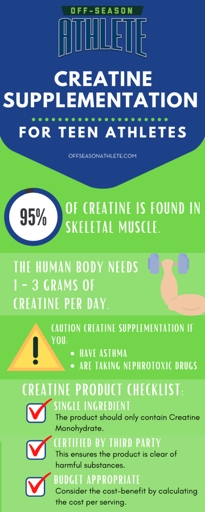
Some experts have suggested that creatine supplementation could cause dehydration, muscle cramps, and gastrointestinal problems. It is also important to note that creatine is often sold as a powder or in capsules, and it is not regulated by the FDA. This means that the quality and safety of creatine supplements can vary greatly.
Until more is known, it is important to talk to a doctor before starting any supplement regimen, especially if you have any health concerns. Overall, more research is needed on the safety of creatine supplementation in teenagers.
Dangers Of Creatine For Teen Athletes
It can also cause gastrointestinal issues like cramping and diarrhea. Creatine can cause dehydration, so it’s important to drink plenty of water when taking it. Creatine is a popular supplement among teen athletes, but there are some dangers to be aware of before taking it.
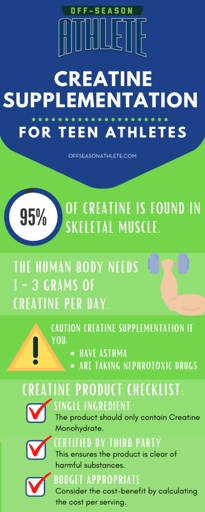
So, it’s important to talk to your doctor before taking this supplement, especially if you have any pre-existing medical conditions. There are also some potential long-term side effects of taking creatine, such as kidney damage.
How To Take Creatine
In fact, creatine might even be beneficial for teens. Some people worry that taking creatine might be unsafe for teens, but there’s no evidence that it’s harmful. Creatine is a substance that is found in the body, and it’s also found in some foods. It’s often taken as a supplement to improve athletic performance and increase muscle mass.
Creatine Loading
It’s also found in some foods, particularly red meat and fish. Creatine plays an important role in our energy metabolism, and it’s often used as a supplement to improve exercise performance. Creatine is a molecule that’s produced naturally in our bodies.
The main concern is that creatine might interfere with normal development and growth. Creatine is thought to be safe for most people, but there are some concerns about its safety in teens.
There’s no evidence that creatine is harmful in teens, but it’s important to talk to your doctor before starting any supplement, especially if your teen has a medical condition or takes medication.
Creatine is typically taken in “loading” and “maintenance” phases. If you decide to give your teen creatine, it’s important to follow the directions on the package.
After the loading phase, they’ll take a lower maintenance dose to keep their muscles saturated. During the loading phase, your teen will take a higher dose of creatine for 5-7 days to help saturate their muscles with creatine.
Creatine can cause dehydration, so it’s important to make sure they stay hydrated. It’s also important to make sure your teen drinks plenty of water when they’re taking creatine.
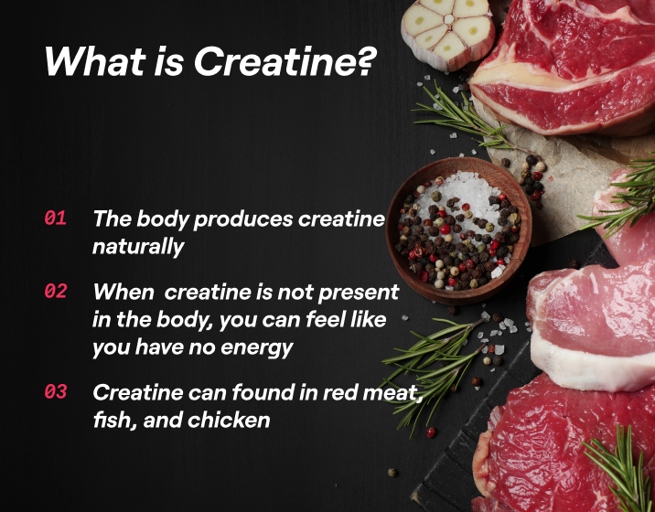
If you have any concerns about creatine or your teen’s health, talk to your doctor.
Low-Dose Daily Supplementation
Creatine is a popular supplement among athletes and bodybuilders. It is often used to improve performance and increase muscle mass. However, there is some concern that creatine may not be safe for teens.
It is also found in some foods, such as red meat and fish. Creatine is a substance that is produced naturally in the body. The body uses creatine to make a substance called phosphocreatine, which is stored in muscle cells. Phosphocreatine is used by the muscles for short bursts of energy, such as during weightlifting or sprinting.
When taken as a supplement, creatine is typically consumed in the form of powder or capsules. The recommended dose of creatine is 0.3-0.5 grams per kilogram of body weight per day. For a 150-pound person, this would be 20-25 grams per day. It is also sometimes added to energy drinks.
Some studies have shown that creatine is safe and effective in teens. There is also concern that creatine may be unsafe for teens who are still growing and developing. However, there is still some concern that long-term use of creatine may be harmful.
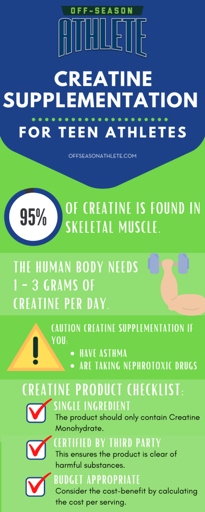
If you are considering taking creatine, it is important to speak with your doctor first. Creatine should only be used under the supervision of a healthcare provider.
Maintenance Protocol
It is also produced in the liver, pancreas, and kidneys. Creatine is a naturally-occurring amino acid that is found in meat and fish. Creatine is used by the body to make ATP (adenosine triphosphate), which is the energy source for muscle contraction.
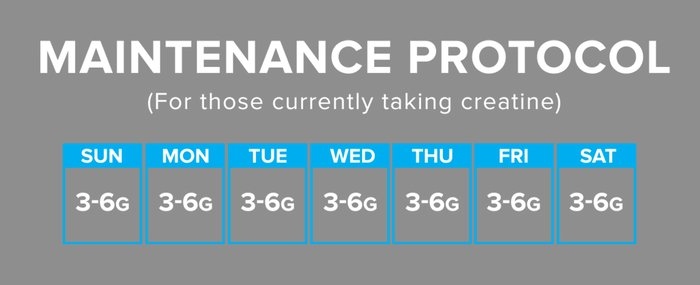
Creatine is generally considered safe, but there are some potential side effects, such as weight gain, cramping, and diarrhea. Teens who are interested in taking creatine should speak with their doctor first. It is also important to make sure that teens are getting enough protein in their diet, as creatine can increase protein requirements.
Creatine should be taken with meals, and it is best to spread the dose out over the day. Creatine should be taken for at least two weeks to see benefits. The recommended dose of creatine is 0.3-0.5 grams per day for teens. For example, if a teen is taking 0.5 grams per day, they could take 0.25 grams in the morning and 0.25 grams in the evening.
If these side effects occur, they are usually mild and go away on their own. If they are severe or persist, teens should stop taking creatine and speak with their doctor. Some teens may experience side effects when taking creatine, such as weight gain, cramping, or diarrhea.
Creatine Supplementation Tips
Creatine is a popular supplement among athletes and bodybuilders. It is often used to improve performance and increase muscle mass. Creatine is safe for most people, but there are a few things to keep in mind when taking it.
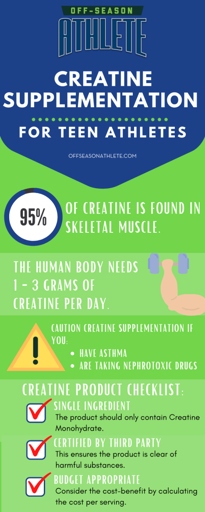
Here are a few tips for safe creatine supplementation:
This will help your body adjust to the supplement and reduce the risk of side effects. – Start with a low dose and increase gradually.
– Drink plenty of water. Creatine can cause dehydration, so it is important to stay well hydrated when taking it.
This can cause insomnia and disrupt your sleep. – Avoid taking creatine before bed.
This will help reduce stomach upset and maximize absorption. – Take creatine with a meal or snack.
Taking too much creatine can cause side effects like weight gain, bloating, and diarrhea. – Avoid taking more than the recommended dose.
If you experience any side effects from creatine, stop taking it and talk to your doctor.
How Much Creatine Should I Take?
For a 150-pound teen, this would be approximately 5 grams per day. Creatine can be taken all at once or divided into smaller doses throughout the day. It is important to drink plenty of water when taking creatine to stay hydrated. The recommended dose of creatine is 0.3 grams per kilogram of body weight per day. Creatine is a safe and effective supplement for teens when used as directed.
How Much Is 5g Of Creatine?
Creatine is a popular supplement among athletes and bodybuilders. It is often used to improve performance and increase muscle mass.
Creatine should be taken with a meal or shake that contains carbohydrates. It is important to drink plenty of water when taking creatine. The recommended dose of creatine is 5g per day.
These side effects are usually mild and go away after a few days. Some people may experience side effects from taking creatine, such as stomach cramps, diarrhea, and bloating.
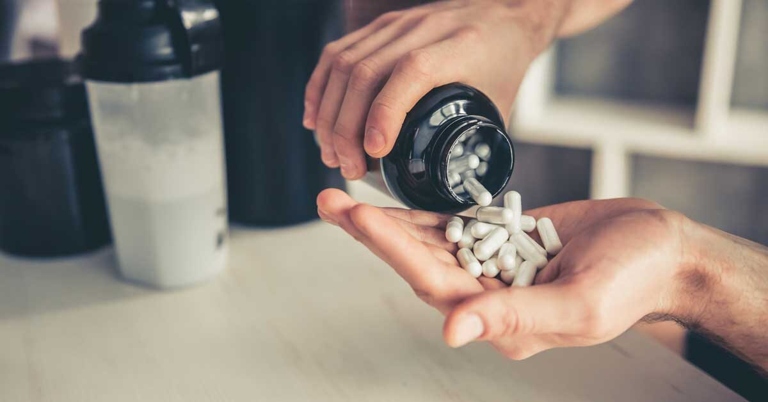
Creatine is generally safe, but there are some risks to taking it, especially if you have a medical condition. If you are considering taking creatine, it is important to talk to your doctor first.
How Long Does It Take For Creatine To Work?
Creatine is a supplement that has been shown to be safe and effective for teens in studies. The recommended dose is 3-5 grams per day. It is best to take creatine after a workout. Creatine should be taken with food and water.
How Long Does Creatine Last?
Creatine is a popular supplement among athletes and bodybuilders. It is often used to improve performance and increase muscle mass. Although creatine is generally considered safe, there are some concerns about its use in teens.
Creatine is a nitrogenous organic acid that occurs naturally in the body. It is produced in the liver, pancreas, and kidneys and is transported to muscles through the bloodstream. Creatine is stored in muscle cells and used for energy production during high-intensity exercise.
Creatine is typically consumed in the form of creatine monohydrate powder mixed with water or juice. Supplemental creatine is thought to increase muscle stores of creatine and phosphocreatine, which can improve exercise performance. It is also available in capsules, tablets, and liquids.
These side effects are usually mild and go away with continued use. Some side effects of creatine supplementation include weight gain, bloating, and gastrointestinal discomfort. Most people can safely take up to 3 grams of creatine per day.
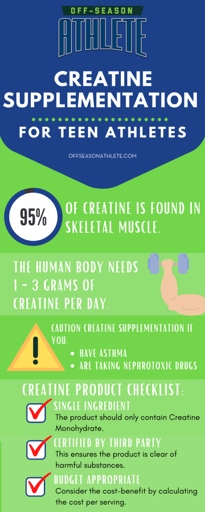
There is also some concern that creatine use may lead to dehydration and heat intolerance. There is some concern that creatine use may be harmful to the kidneys, especially when taken in large doses. These concerns are largely theoretical and have not been proven in studies.
If you are considering taking creatine, talk to your doctor first. Creatine is not recommended for teens with kidney problems or dehydration. It is also not recommended for teens who are not active in sports or exercise.
How Long Should You Take Creatine?
It is also important to drink plenty of water when taking creatine, as it can cause dehydration. Creatine should be taken with a carbohydrate-rich meal to maximize absorption. For a 70 kg teen, this would be 21-35 grams of creatine per day. Creatine is a supplement that has been shown to be safe and effective for increasing muscle mass and strength. The recommended dose of creatine is 0.3-0.5 grams per kilogram of body weight per day.
How Old Do You Have To Be To Buy Creatine?
There is no definitive answer to this question since creatine is not regulated by the FDA. However, more research is needed to confirm these effects. However, most experts agree that creatine is likely safe for teens to use, as long as they are healthy and exercise regularly. Some research suggests that creatine may be beneficial for teens, as it can help improve exercise performance and increase muscle mass. If your teen is interested in using creatine, talk to their doctor or a certified sports nutritionist to ensure it is safe for them to use.
Do you Need An ID To Buy Creatine?
Do you need an ID to buy creatine?

However, some stores may require you to be 18 years of age or older to purchase creatine. Creatine is a legal supplement that can be purchased without a prescription. No, you do not need an ID to buy creatine.
Is Creatine Legal for High School Athletes?
Creatine is a popular supplement among high school athletes, but there is some debate over whether or not it is safe for teens to use. It is also produced in the body, and plays an important role in energy production. Creatine is a naturally occurring amino acid that is found in meat and fish.
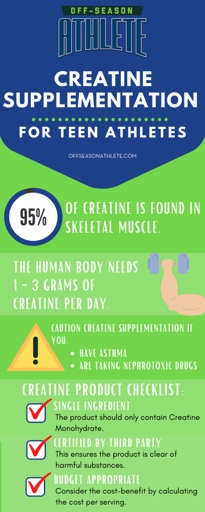
One study found that creatine supplementation increased the risk of dehydration and heat illness in high school football players. Some studies have shown that creatine supplementation can improve exercise performance, but there is concern that it may be harmful to teens.
A small percentage of people who take creatine supplements experience kidney problems, and there is some evidence that teens are more susceptible to these side effects. There is also concern that creatine may cause kidney damage.
The Academy advises that teens should get their nutrients from a healthy diet, and that they should talk to their doctor before taking any supplements. The American Academy of Pediatrics does not recommend creatine supplementation for teens.
Can Creatine Stunt Growth?
Can Creatine Stunt Growth?
For example, one study found that creatine supplementation increased muscle mass and strength in teenage boys. In fact, some research suggests that creatine may actually promote growth and development in teens. There is no scientific evidence to suggest that creatine supplementation can stunt growth in healthy adolescents.
Therefore, more research is needed to determine the safety and efficacy of creatine supplementation in teens. However, it is important to note that most of the research on creatine has been conducted in adults, not adolescents.

Some parents and experts are concerned that creatine supplementation could stunt growth by causing dehydration or by damaging the kidneys. In fact, the vast majority of people who supplement with creatine experience no side effects. However, there is no scientific evidence to support these concerns.
They can help you weigh the potential risks and benefits of supplementation and make an informed decision. If you are considering creatine supplementation for your teen, we recommend that you speak with a doctor or other healthcare provider first.
Does Creatine Cause Acne?
It is also found in some foods, such as red meat and fish. Creatine is a substance that is produced naturally in the body. Creatine is often sold as a dietary supplement.
However, there is no evidence that it improves athletic performance in teens. Creatine is sometimes used by athletes to improve performance.
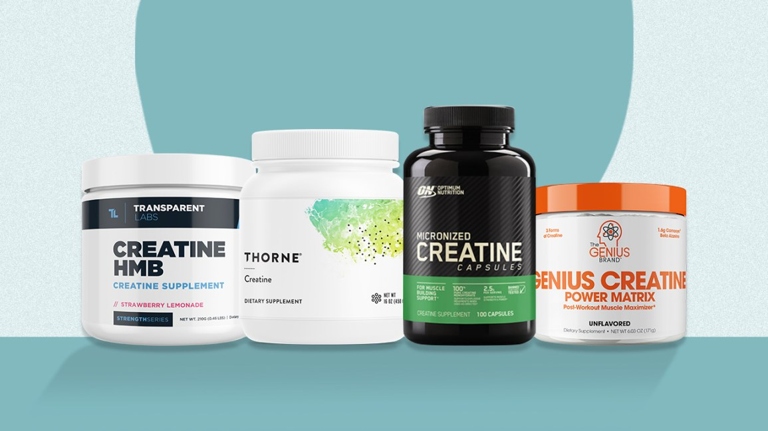
However, there is no scientific evidence to support this claim. Some people believe that creatine causes acne.
Can Creatine Make You Angry?
Can Creatine Make You Angry?

If you notice any changes in your mood while taking creatine, be sure to talk to your doctor. It’s possible that creatine could make you angry. Some people report feeling irritable, aggressive, or even hostile when taking creatine.
Does Creatine Cause Anxiety?
While there is no definitive evidence that creatine causes anxiety, there are a few reports of people feeling more anxious after taking it. Creatine is a popular supplement among athletes and bodybuilders, but there is some concern that it may cause anxiety in some people, especially teens. If you are considering taking creatine, it is important to talk to your doctor or a qualified health professional first, to make sure it is safe for you.
Does Creatine Change Your Face?
Creatine is a popular supplement among athletes and bodybuilders. It is often used to improve performance and increase muscle mass. Some people believe that creatine can also change the way your face looks.
However, some people say that they have noticed changes in their facial appearance after taking creatine. These changes can include an increase in acne, changes in the color of your skin, and an increase in the size of your muscles. There is no scientific evidence to support this claim.
Creatine is generally considered safe, but there are some potential side effects that you should be aware of. These side effects include stomach cramps, diarrhea, and dehydration. If you are considering taking creatine, it is important to speak with your doctor first.

This will help to reduce the risk of side effects. If you do decide to take creatine, be sure to drink plenty of water and stay hydrated.
Can Creatine Cause Brain Damage?
It is sometimes promoted for improving exercise performance and increasing muscle mass. It is also found in some foods, such as red meat and fish. Creatine is often sold as a dietary supplement. Creatine is a substance that is found in the body, mostly in the muscles.
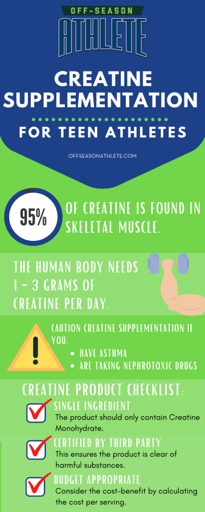
There is some concern that creatine might cause brain damage, especially in people who have certain medical conditions. In fact, most research suggests that creatine is safe for most people. However, there is no evidence to support this claim.
This is especially important for teens with medical conditions or who are taking medication. Creatine is generally considered safe for teens. However, as with any supplement, it is important to speak with a healthcare provider before starting to use it.
Why Do I Feel Weird After Taking Creatine?
There are a few potential reasons why you might feel weird after taking creatine. It’s possible that you are experiencing some side effects from the supplement, or it could be that your body is not responding well to the creatine. It’s also possible that you are not taking the right amount of creatine, or you are not taking it correctly. If you are unsure about why you are feeling weird, it’s important to talk to your doctor or a qualified healthcare professional.
These side effects can include stomach pain, cramping, diarrhea, and nausea. If you experience any of these side effects, it’s important to stop taking creatine and talk to your doctor. Although creatine is generally considered safe, there are some potential side effects that can occur when taking the supplement. Creatine is a popular supplement that is often used by athletes and bodybuilders to help increase muscle mass and strength.

If you are taking creatine for the first time, it’s important to start with a lower dose and increase it gradually as your body gets used to it. If you take too much, it can lead to problems such as dehydration, muscle cramps, and diarrhea. It’s also important to drink plenty of fluids when taking creatine, as this can help to prevent dehydration. It’s also important to make sure that you are taking the right amount of creatine.
If you are still feeling weird after taking creatine, it’s important to talk to your doctor or a qualified healthcare professional to rule out any other potential causes.
Frequently Asked Questions
1. What is creatine?
Creatine is a substance that’s found naturally in the body, mostly in skeletal muscle. It’s also found in small amounts in the brain. Creatine helps supply energy to cells, particularly muscle cells.
2. How does creatine work?
When you take creatine as a supplement, it’s stored in your muscles in the form of phosphocreatine. During high-intensity exercise, phosphocreatine is used by your muscles for energy. This helps to improve your performance during short bursts of activity, such as sprinting or lifting weights.
3. Is creatine safe?
Creatine is one of the most-researched supplements on the market. It’s generally considered safe, but there are a few potential side effects to be aware of. These include weight gain, bloating, and gastrointestinal issues.
4. Are there any risks associated with taking creatine?
Creatine is generally considered safe, but there are a few potential side effects to be aware of. These include weight gain, bloating, and gastrointestinal issues. If you have any pre-existing medical conditions, it’s important to speak to your doctor before taking creatine.
5. Can teens take creatine?
Yes, creatine is safe for teens to take. If you’re considering taking creatine, it’s important to speak to your doctor first. This is especially important if you have any pre-existing medical conditions.
6. Will taking creatine cause me to gain weight?
Creatine may cause weight gain in some people, but not everyone. If you’re concerned about gaining weight, it’s important to speak to your doctor before taking creatine.
7. I’m a teenager. Is it safe for me to take creatine?
Yes, creatine is safe for teens to take. If you’re considering taking creatine, it’s important to speak to your doctor first. This is especially important if you have any pre-existing medical conditions.
8. I’m a competitive athlete. Can I take creatine?
Creatine is banned by some competitive athletic organizations. If you’re considering taking creatine, it’s important to check with your organization first to see if it’s allowed.
9. I’m pregnant. Can I take creatine?
Creatine is generally considered safe for pregnant women, but it’s always best to speak to your doctor before taking any supplements.
10. I have a kidney condition. Can I take creatine?
Creatine is generally considered safe for people with kidney conditions, but it’s always best to speak to your doctor before taking any supplements.
Final thoughts
Creatine is a popular supplement among athletes, but there is some concern that it is not safe for teens. The good news is that creatine is generally safe for teens when used in moderation. However, there are a few potential side effects to be aware of, such as weight gain and dehydration. teens should also be sure to drink plenty of water when taking creatine. Overall, creatine is a safe supplement for teens when used properly.